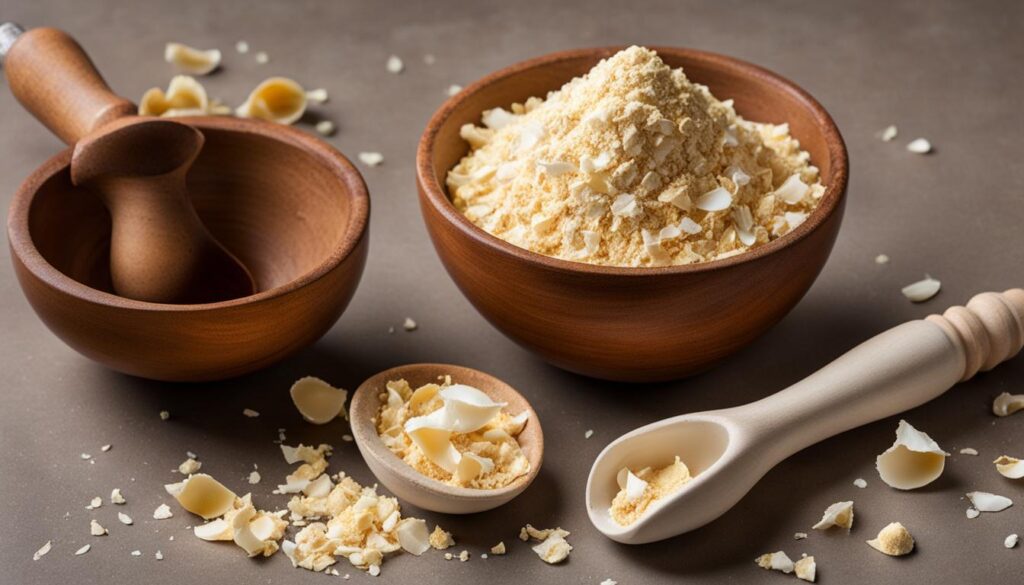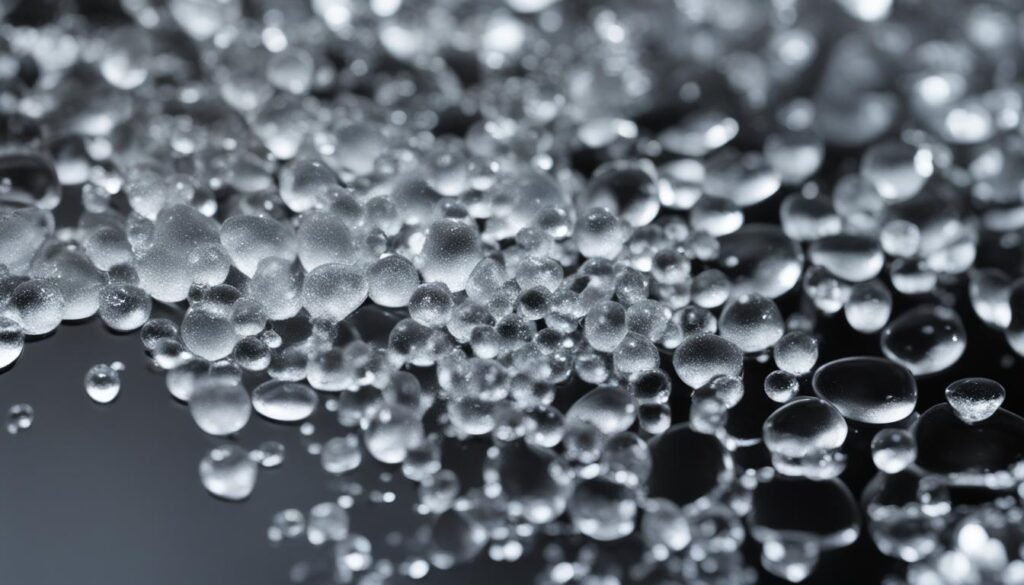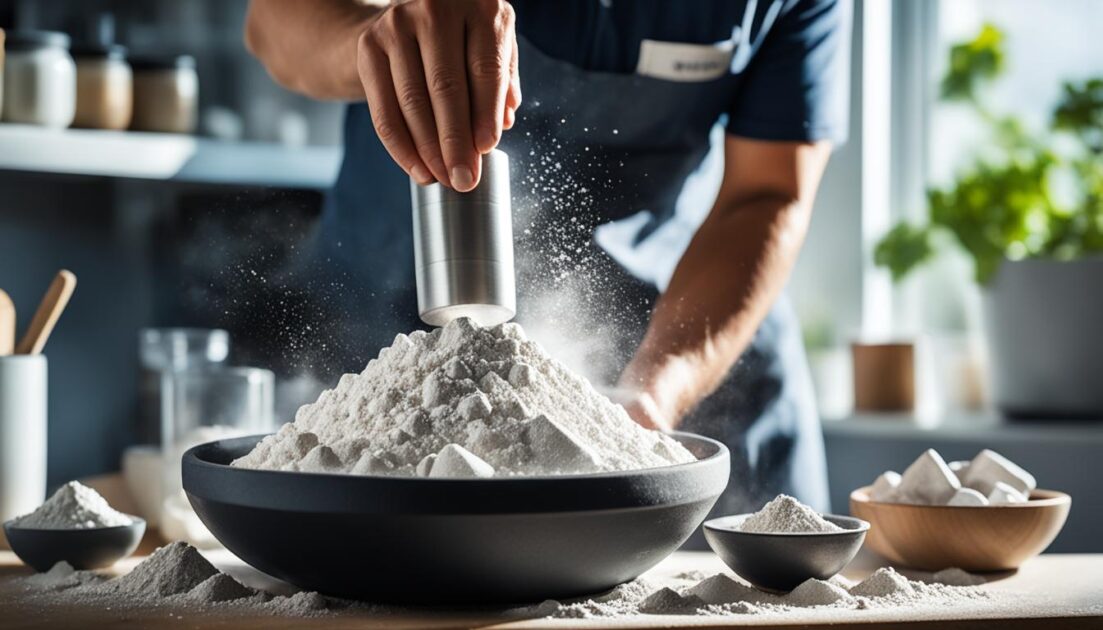Welcome to my comprehensive DIY guide on how to make calcium carbonate at home. In this article, I will provide you with simple step-by-step instructions to create homemade calcium carbonate powder using eggshells. Calcium carbonate is an essential mineral that supports bone health, teeth, and overall body wellness. By making your own calcium powder, you can ensure its purity and maximize its benefits.
Calcium carbonate plays a vital role in remineralizing teeth and bones. It closely resembles the calcium found in our teeth and bones, making it an excellent natural supplement. By incorporating homemade calcium carbonate into your daily routine, you can enhance your oral and bone health in a cost-effective and convenient way.
In the following sections, we will explore the science behind calcium carbonate, the benefits of calcium supplementation, and detailed instructions on how to make your own calcium powder using eggshells. Additionally, we will discuss alternative methods of using eggshell powder as a water-soluble solution and a natural fertilizer for your garden. Let’s dive in!
Key Takeaways:
- Calcium carbonate is essential for bone health and teeth remineralization.
- You can create homemade calcium carbonate powder using eggshells.
- DIY calcium carbonate offers a cost-effective and convenient way to supplement your calcium intake.
- Eggshells are a rich source of calcium carbonate, comprising about 95% of it.
- Stay tuned for detailed instructions on making calcium powder and alternative uses for your homemade calcium carbonate.
The Benefits of Calcium and the Importance of Calcium Carbonate
Calcium plays a crucial role in maintaining strong teeth and bones, making it an essential mineral for overall health and wellness. The National Institute of Health (NIH) recognizes the effectiveness of calcium in promoting the remineralization of teeth and bones, reinforcing their strength and integrity.
One of the best ways to supplement our bodies with calcium is through calcium carbonate. Calcium carbonate closely resembles the calcium found in our teeth and bones, making it easily absorbable and beneficial for supporting bone health and remineralizing teeth.
Calcium offers a myriad of benefits to our bodies. Here are some key advantages:
- Supports bone health and prevents conditions like osteoporosis
- Promotes healthy teeth and prevents dental problems
- Aids in muscle function
- Facilitates proper blood clotting
- Supports a healthy nervous system
- Helps regulate the heartbeat
Remineralizing teeth is particularly important for maintaining good oral health. Calcium carbonate offers a natural way to strengthen tooth enamel and combat tooth decay. By incorporating calcium carbonate into our daily routine, we can support healthy teeth and prevent dental issues.
In addition to teeth, calcium also plays a vital role in maintaining strong bones. As we age, our bones gradually lose density, which can lead to conditions like osteoporosis. Supplementing with calcium carbonate can help preserve bone density and reduce the risk of fractures and bone-related diseases.
To visually illustrate the benefits of calcium and calcium carbonate, consider the following table:
| Benefits of Calcium and Calcium Carbonate |
|---|
| Supports bone health and prevents osteoporosis |
| Promotes healthy teeth and prevents dental problems |
| Aids in muscle function |
| Facilitates proper blood clotting |
| Supports a healthy nervous system |
| Helps regulate the heartbeat |

As you can see, calcium and calcium carbonate offer a multitude of benefits for our overall well-being. By prioritizing the consumption of calcium-rich foods or supplements like calcium carbonate, we can support our bone health, strengthen our teeth, and maintain optimal physical function.
Using Eggshells to Make Calcium Powder
Eggshells are a remarkable natural source of calcium carbonate, containing approximately 95% calcium carbonate. The composition of eggshells makes them an ideal ingredient for creating homemade calcium powder. In this section, I will explain how to use eggshells to make calcium powder, providing you with a sustainable and cost-effective way to boost your calcium intake.
The first step in making calcium powder from eggshells is to collect and prepare the eggshells. It is essential to use high-quality eggs from chickens raised in a healthy environment to ensure optimal calcium content in the eggshells. Once you have gathered enough eggshells, rinse them thoroughly to remove any residue.
“Eggshells are a remarkable natural source of calcium carbonate, containing approximately 95% calcium carbonate.”
After rinsing, the next crucial step is to boil the eggshells. Boiling the eggshells helps remove any potential pathogens, ensuring that the resulting calcium powder is safe for consumption. Boil the eggshells in water for around 5 to 10 minutes, then strain them and let them cool.
Once the boiled eggshells have cooled down, they are ready for the next stage of the process: converting them into calcium powder. Before pulverizing the eggshells, let them dry completely. You can do this by spreading them out on a clean baking sheet and leaving them to air dry for a few days. Alternatively, you can also dry them in an oven at a low temperature for a short period.
Once the eggshells are dry, grind them into a fine powder using a blender, food processor, or mortar and pestle. The finer the powder, the easier it will be to incorporate into your diet or use it in other applications.
Here is an easy-to-follow step-by-step guide for making calcium powder from eggshells:
- Collect high-quality eggshells.
- Rinse the eggshells thoroughly.
- Boil the eggshells for 5 to 10 minutes.
- Let the boiled eggshells cool down.
- Dry the eggshells completely by air drying or using a low-temperature oven.
- Grind the dried eggshells into a fine powder using a blender, food processor, or mortar and pestle.
By following these simple steps, you can create your calcium powder at home using eggshells. Incorporating calcium powder into your diet can provide numerous benefits for your bone health and overall well-being.

Step-by-Step Guide: How to Make Calcium Powder from Eggshells
Creating your own calcium powder from eggshells is a simple process that can provide you with a cost-effective and natural source of calcium. Follow these step-by-step instructions to make your own eggshell calcium powder:
Step 1: Rinse and Save Eggshells
After using eggs, carefully rinse the shells with water to remove any traces of egg white or yolk. Set aside the rinsed eggshells to accumulate a sufficient quantity for the next steps.
Remember to handle eggshells with care to avoid contamination and ensure food safety.
Step 2: Boil and Bake the Eggshells
Place the accumulated eggshells in a pot of boiling water. Boil the eggshells for about five minutes to effectively eliminate any potential pathogens. After boiling, drain the water and transfer the eggshells to a baking tray.
Preheat your oven to 350°F (175°C) and bake the eggshells for 10-15 minutes to further remove any residual substances and ensure safety. Keep an eye on the eggshells to prevent them from burning.
Step 3: Crush and Pulverize the Eggshells
Once the eggshells have cooled, use a pestle and mortar or a blender to crush and pulverize them into a fine powder. Ensure the powder is finely ground to maximize its usability.
Step 4: Store the Calcium Powder
Transfer the eggshell calcium powder to an airtight container for storage. It is important to keep the powder in a cool, dry place to maintain its quality and shelf life. Label the container with the date of preparation for reference.
Step 5: Recommended Dosage
To incorporate the homemade calcium powder into your diet, it is suggested to start with a small dosage, such as 1/4 to 1/2 teaspoon per day, and gradually increase the amount as desired. Consult with a healthcare professional or nutritionist for personalized recommendations.
Benefits of Homemade Calcium Powder
| Benefits | |
|---|---|
| 1. Rich Source of Calcium | Eggshells are approximately 95% calcium carbonate, making them an excellent natural source of calcium. |
| 2. Cost-Effective | Making calcium powder from eggshells at home is an economical alternative to purchasing store-bought calcium supplements. |
| 3. Customizable Dosage | By preparing your own calcium powder, you have control over the dosage and can tailor it to your specific needs and preferences. |
| 4. Environmentally Friendly | Reusing eggshells reduces waste and promotes sustainability by utilizing a readily available resource. |
By following this step-by-step guide, you can successfully create your own calcium powder from eggshells. Enjoy the benefits of this natural and cost-effective source of calcium to support your overall health and well-being.
Water Soluble Calcium: An Alternative Method
Water soluble calcium is a popular choice among gardeners and farmers looking to provide their plants with a quick and effective calcium boost. While homemade water soluble calcium can be easily made using eggshells and vinegar, it is important to understand its benefits and how to use it properly.

The process of making homemade water soluble calcium involves utilizing the natural calcium content found in eggshells and combining it with vinegar to create a highly soluble form that can be readily absorbed by plants. The acidity of vinegar helps break down the calcium carbonate in the eggshells, resulting in a water soluble calcium solution.
Recipe and Ingredients
To make your own water soluble calcium, you will need:
- Crushed eggshells
- Vinegar
- Water
Here is a step-by-step guide to creating homemade water soluble calcium:
- Collect and clean eggshells from organic, free-range eggs.
- Crush the eggshells into small pieces or powder using a mortar and pestle.
- In a glass container, combine the crushed eggshells with vinegar. Use enough vinegar to fully cover the eggshells.
- Cover the container and let it sit for several days, allowing the vinegar to dissolve the calcium carbonate in the eggshells.
- After a few days, strain the solution to remove any solid particles.
- Dilute the solution with water. The recommended ratio is 1 part calcium solution to 10 parts water.
Benefits of Water Soluble Calcium
“Water soluble calcium provides plants with a readily available source of calcium, promoting healthy growth, stronger cell structure, and improved nutrient absorption.”
The use of water soluble calcium offers several benefits for plant growth and nutrition. Some of the key advantages include:
- Promotes healthy growth: Calcium is essential for plant cell division, elongation, and proper development. Water soluble calcium provides plants with a readily available source of calcium, promoting healthy growth and overall plant vigor.
- Enhances cell structure: Calcium plays a vital role in building strong cell walls, which provide structural support and protect plants from various stresses such as diseases and pests. Water soluble calcium helps strengthen the cell structure, making plants more resistant to damage.
- Improves nutrient absorption: Calcium is necessary for nutrient uptake in plants. By providing plants with water soluble calcium, the overall absorption of other essential nutrients is enhanced, leading to healthier and more productive plants.
Tips for Using Water Soluble Calcium
When using water soluble calcium in your garden or farm, consider the following tips:
- Apply the solution to the soil around the plants, taking care to avoid direct contact with plant foliage.
- Apply water soluble calcium solution during the early morning or late afternoon to minimize evaporation and maximize absorption.
- Monitor the pH levels of your soil to ensure optimal nutrient availability. Adjust the pH if necessary.
- Test the solution on a small area of plants before applying it to the entire garden or farm to assess any potential adverse effects.
| Advantages of Water Soluble Calcium | Disadvantages of Water Soluble Calcium |
|---|---|
| Quick and easy absorption by plants | Potential risk of over-application and nutrient imbalance |
| Improves overall plant growth and health | Requires regular application for continued benefits |
| Enhances nutrient uptake and availability | May be less cost-effective compared to other calcium sources |
Using Eggshell Powder as a Fertilizer in the Garden
Eggshell powder is a fantastic natural fertilizer that can greatly benefit your garden. By incorporating eggshell powder into your soil, you can provide essential nutrients, including calcium, to your plants, promoting their overall health and growth.
The benefits of using eggshell powder as a fertilizer are numerous. Firstly, eggshells are rich in calcium, which is vital for the development of strong cell walls in plants. Calcium helps plants resist diseases and pests, preventing them from penetrating the plant’s tissues and causing damage.
Additionally, calcium plays a crucial role in the absorption and transport of other essential nutrients in plants. By ensuring an adequate supply of calcium with eggshell powder, you can improve the overall nutrition of your plants, resulting in healthier growth and more productive yields.
To effectively use eggshell powder as a fertilizer, you can follow these simple steps:
- Collect and clean eggshells: Rinse the eggshells thoroughly with water to remove any residual egg content. Allow them to dry completely.
- Crush the eggshells: Once dried, crush the eggshells into small pieces. You can use a mortar and pestle or a blender to achieve a fine powder.
- Apply to soil: Sprinkle the eggshell powder evenly over the soil around your plants, making sure to cover the root zone.
- Mix into compost: Alternatively, you can add eggshell powder to your compost pile. The calcium-rich powder will enrich the compost, which can then be incorporated into the soil.
- Recommended dosage: As a general guideline, you can use around half a cup of eggshell powder per square meter of soil. Adjust the amount based on the specific needs of your plants and the calcium content of your soil.
It’s important to note that eggshell powder takes time to break down and release its nutrients into the soil. Therefore, it’s best to apply it in advance, ideally when preparing the soil before planting or during the early stages of growth.
Some plants that particularly benefit from the additional calcium provided by eggshell powder include tomatoes, peppers, and broccoli. These plants have a high calcium requirement and can develop issues like blossom end rot if calcium levels are inadequate.
Incorporating eggshell powder as a natural fertilizer in your garden is not only cost-effective and environmentally friendly but also a great way to support the health and vigor of your plants. By providing essential calcium and other nutrients, you can promote stronger, more resilient plants that thrive in your garden.
Other Uses for Eggshell Powder
Eggshell powder, in addition to its role as a natural fertilizer, can be creatively utilized in various ways. Its versatility makes it a valuable resource in multiple aspects of everyday life, offering unique benefits beyond its calcium content. Here are a few innovative applications for eggshell powder:
1. Repellent for bugs: Suffering from a bug problem? Eggshell powder can be utilized as an effective repellent to deter pests such as ants, slugs, and snails. Simply sprinkle a generous amount of the powder around affected areas or create barriers by forming a line directly on their pathways. This natural solution not only keeps bugs at bay but also provides a safe alternative to harmful chemicals.
2. Enhancer for vegetables and fruits: Are you looking to add a boost of flavor and nutrition to your homegrown produce? Incorporating eggshell powder into your gardening routine can do just that. By incorporating a small amount of eggshell powder into the soil, you can enrich the nutrient composition, promote healthy plant growth, and enhance the taste and quality of your vegetables and fruits.
3. Calcium supplement for chickens: If you raise chickens, providing them with a balanced diet is essential. Eggshell powder can be an excellent source of additional calcium for your feathered friends. By mixing the powder into their feed, you can help strengthen their eggshells and overall health. Not only are you recycling eggshells, but you’re also ensuring the well-being of your feathered companions.
FAQ
What are the benefits of calcium and the importance of calcium carbonate?
Calcium is crucial for maintaining strong teeth and bones. It is effective in remineralizing teeth and bones and supports bone health. Calcium carbonate, which closely resembles the calcium in our teeth and bones, is an excellent way to supplement our bodies with calcium.
How can I use eggshells to make calcium powder?
Eggshells are an excellent source of calcium carbonate. To make calcium powder from eggshells, collect and prepare the eggshells by rinsing and boiling them to remove pathogens. Then, crush and pulverize the eggshells to create a fine powder.
Can you provide a step-by-step guide on how to make calcium powder from eggshells?
Certainly! To make calcium powder from eggshells, first, rinse and save the eggshells. Then, boil and bake them to ensure safety and remove any residual substances. Finally, crush and pulverize the eggshells to create a fine powder. Make sure to store the calcium powder properly to maintain its shelf life.
Is there an alternative method for making water soluble calcium?
Yes, an alternative method for making water soluble calcium is using eggshells and vinegar. This method involves combining crushed eggshells with vinegar to create a solution that can be used as a quick calcium boost for plants.
How can I use eggshell powder as a fertilizer in the garden?
Eggshell powder can be used as a natural fertilizer in the garden. It provides calcium to plants, resulting in stronger cell walls, increased resistance to disease and pests, and improved plant nutrition. Simply apply the powder to the soil, ensuring the recommended amount is used for different types of plants.
Are there any other uses for eggshell powder?
Yes, there are various other uses for eggshell powder. It can be used to repel bugs, add flavor to vegetables and fruits, and even provide a calcium supplement for chickens. There are countless creative ways to incorporate eggshell powder into everyday life for its diverse benefits.






